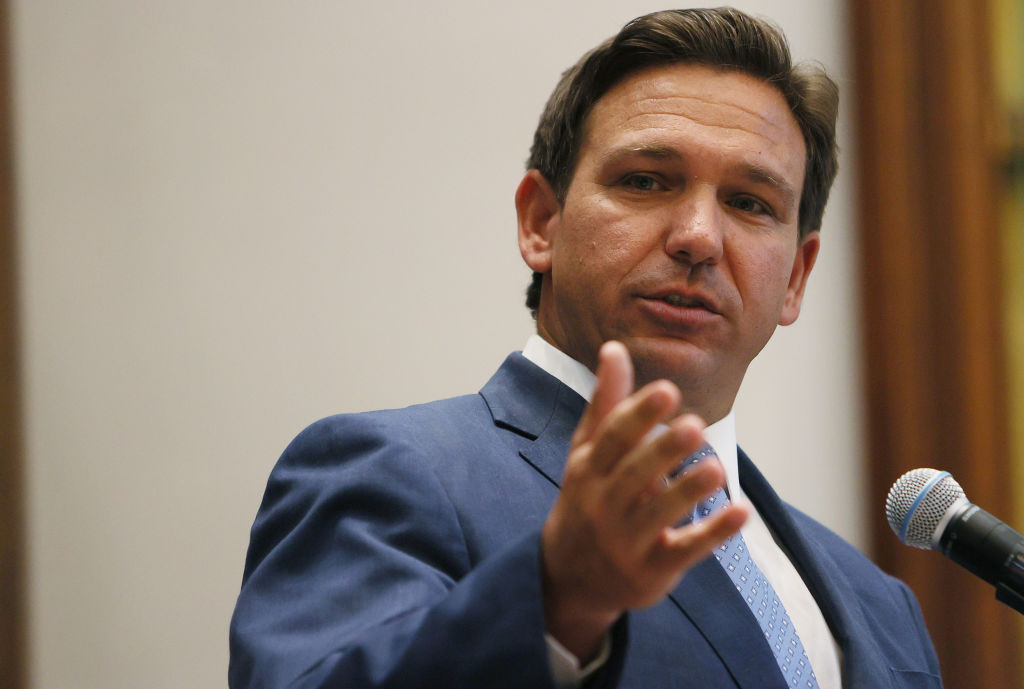What’s left of the Bush-Cheney wing of the Republican Party doesn’t like Ron DeSantis. But it’s eager to see him run for president anyway. For if DeSantis challenges Trump for the 2024 GOP nomination, the old establishment stands to gain no matter who ultimately gets the nod. The Florida governor certainly seems to be ideologically closer to Trump-style populism than to the neoconservatism that prevailed among elite Republicans from the end of the Reagan era to the defeat of Mitt Romney in 2012. Why, then, would those who pine for the likes of Bush and Romney want to see a choice between Trump and DeSantis, both right-wing populists, two years from now?
Many of the old guard’s most prominent pundits and officeholders — past and (in dwindling numbers) present — publicly denounce Trump and DeSantis alike. But pay attention to those Republican mouthpieces of yesteryear who have not followed Bill Kristol and Max Boot into the embrace of the Democratic Party. Media outlets and individual voices who opposed Trump in 2016, then reluctantly supported him once he was in power, are now boosting DeSantis. This is not because they think DeSantis will be a more effective populist president, though to be sure many risk-averse Republicans believe the governor has a better chance of winning in 2024. (They believed Trump was too risky in 2016, too — yet never thought that about losers like Romney or John McCain.)
There is an ideological dimension to the desire to see a Trump-DeSantis showdown. The logic runs as follows: DeSantis will probably not be able to outflank Trump to the populist right. But he can count on a certain amount of populist support, especially among the more pragmatic populists who think his odds of winning in November are better or that he will govern more competently. The populist heart may want Trump, but many heads are for DeSantis next time.
DeSantis will not lose these pragmatic populists if he also appeals to pragmatists from other factions of the party. Faced with a wildly populist Trump, DeSantis, so this line of reasoning goes, will have an incentive to position himself as a distinct alternative — a hybrid populist and conventional Republican. In this scenario DeSantis would signal that he rejects some of Trump’s views on foreign policy, trade or (least likely) immigration. With DeSantis compelled to campaign as a somewhat more conventional Republican, he might feel obliged to govern as a more conventional Republican as well. It would be embarrassing to backtrack, and politically hazardous too.
Thus, even though DeSantis may indeed be closer to Trump than to the old guard, he may prove to be an instrument for reducing the sway of populism within the party. And that’s true whether or not he actually beats Trump in the race for the nomination. What is important for the ideological future of the party is that there be an anti-Trump pole around which the old guard can coalesce. It may even be optimal for Trump’s GOP critics if DeSantis falls short of the nomination, so that he can be discarded in the favor of a more thoroughly conventional Republican in 2028, assuming (as the old guard generally does) that Trump loses in 2024 or for one reason or another cannot complete his term even if he wins.
DeSantis as a hybrid candidate, part-populist, part-conventional, holds promise for those who want to roll back the GOP’s turn toward populism. But another scenario may be equally promising if DeSantis proves to be wholly right-wing — that is, if he does dare to challenge Trump from the populist side of the party. In that case, should DeSantis prove appealing enough to Trump’s own core supporters, there’s a chance that some third, more conventional candidate might just be able to snatch the nomination. Short of that, a division between Trump and DeSantis that does not create enough of an opening for a non-populist candidate may nonetheless lead to a new coalition configuration, with DeSantis or Trump having to make concessions to this third contender to win the nomination.
That scenario will not put Mike Pence back on a Donald Trump ticket. But it could put a Pence-like Republican on the ticket of either Trump or DeSantis.
There is no downside for anti-populist Republicans if DeSantis challenges Trump. Whether DeSantis runs as more Trumpian than Trump himself or as a compromise between Trump and the GOP old guard, he will give new force to the presently flagging anti-populist side of the party. The Republicans who voted to impeach Trump in January 2021 have mostly been banished from the party, in some cases declining to run for re-election this year and in others losing their primary battles. But DeSantis, as unlikely a savior as he might seem, can open a path back to the party for those who have always despised the direction in which Trump has led it. This may not be the role that Ron DeSantis wants to play, but unless he is very careful it is the one he will be assigned.
The country was ill-served by Republican leaders who indulged in global adventurism, placed a low priority on immigration enforcement, and pursued a trade policy more beneficial to China’s industry than America’s. Powerful interests want to see the GOP slide back into its old ways. DeSantis should not let those interests use him. He has fateful decisions to make for himself, his party, and the country. He should make them with a view to the long run, when he will be an obvious choice for the party’s new guard.
This article was originally published in The Spectator’s September 2022 World edition.


















